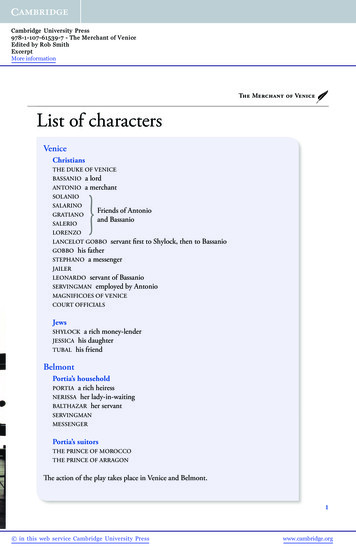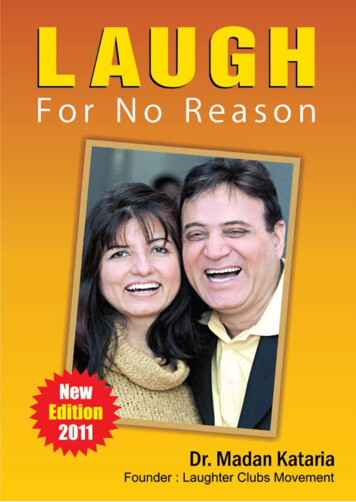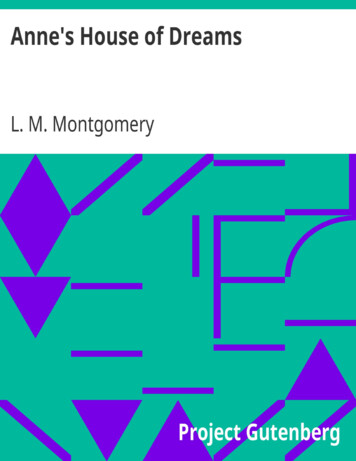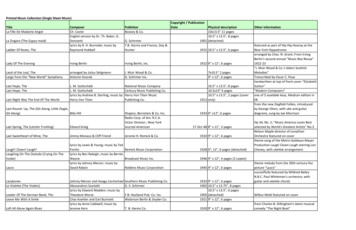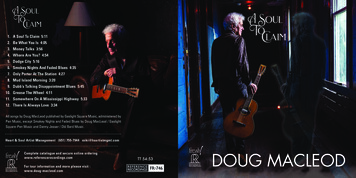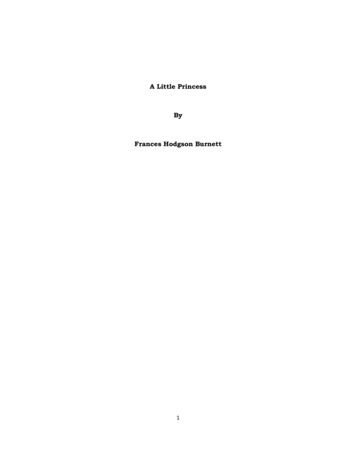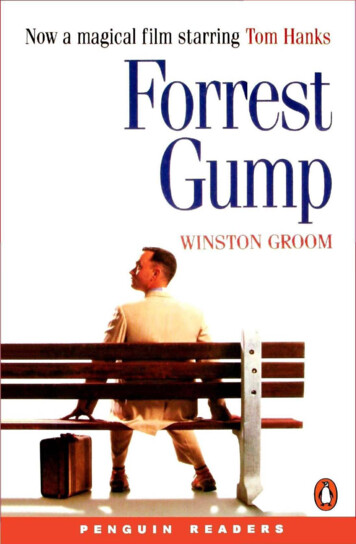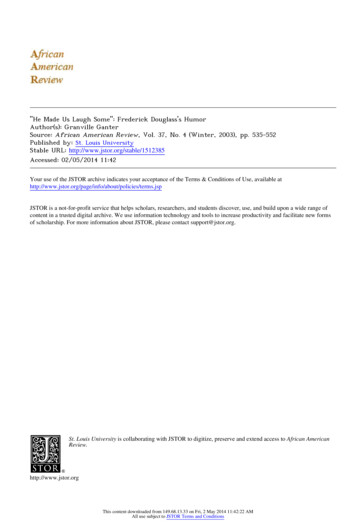
Transcription
"He Made Us Laugh Some": Frederick Douglass's HumorAuthor(s): Granville GanterSource: African American Review, Vol. 37, No. 4 (Winter, 2003), pp. 535-552Published by: St. Louis UniversityStable URL: http://www.jstor.org/stable/1512385 .Accessed: 02/05/2014 11:42Your use of the JSTOR archive indicates your acceptance of the Terms & Conditions of Use, available at ms.jsp.JSTOR is a not-for-profit service that helps scholars, researchers, and students discover, use, and build upon a wide range ofcontent in a trusted digital archive. We use information technology and tools to increase productivity and facilitate new formsof scholarship. For more information about JSTOR, please contact support@jstor.org.St. Louis University is collaborating with JSTOR to digitize, preserve and extend access to African AmericanReview.http://www.jstor.orgThis content downloaded from 149.68.13.33 on Fri, 2 May 2014 11:42:22 AMAll use subject to JSTOR Terms and Conditions
"He Made Us Laugh Some":FrederickDouglass'sHumorAmong FrederickDouglass's formidableskills as a criticof.Lkslavery and racialprejudice,he was widely rememberedduring the nineteenthcentury for being able to make his audiences laugh. Toward the end of Douglass's final autobiography,TheLifeand Times,he remarksthat "Ihave been greatly helped tobear up under unfriendlyconditions,too, by a constitutionaltendency to see the funny side of things" (470).In support of hisclaim, he tells a story of riding a crowded night trainthroughNew YorkState.As one of the few passengerswho had a wholebench seat to himself, he covered his head and went to sleep.When a well-dressed white man asked him to slide over,Douglass sat up and said, "'Don't sit down here, my friend, I ama nigger.' " " 'I don't carewho the devil you are,' " the manresponded. "'I mean to sit with you,"' to which Douglassreplied, " 'Well, if it must be so, I can stand it if you can' " (470).Douglass concludes the anecdote by noting that the two men thenstruckup an agreeableconversationfor the rest of the trip.As is typical of Douglass's rhetoric,the story turns on severalironies,not the least of which is his preferenceto be treated likean equal citizen despite the fact it might bring temporarydiscomfort.The story is important,too, because of the egalitarianturn ofDouglass's final remark.His grumblingconsent to the whiteman's request reverses the roles of a painfully familiarracialtableauin which the person of color requestsa seat. Most importantly, however, the scene is characteristicof the dialecticbetween violence and humor that animatesmuch of Douglass'srhetoric:The affectionateand benevolent term myfriendhardlybelongs in the same sentence with the word nigger.This contrastbetween pain and pleasure characterizesmany Douglass anecdotes. At his best, Douglass could win his enemies' admirationbymaking them smile with him. But as Spike Lee has recently illustrated in his thoughtful film Bamboozled,making white folkslaugh in this way has always had its dangers.As a newspapereditor, Douglass was well-known for his dislike of minstrelhumor, and when he joked in public, he knew that he might bemeasured against those standards.By exploiting his audiences'likely prejudices,however, Douglass used humor to transformhimself from a social pariahinto an equal. In other words, whileDouglass attempted to separatehimself from the cliches of plantation comedy, he often deliberatelyinvoked those genres of bigoted humor in the service of the abolitionistcause.Becausemodern literarycriticshave generallyrepresentedDouglass with earnestpassages taken from his Narrative,therehas been a tendency to cast him in the singular role of righteousanti-slaverycrusader.Naturally,Douglass and WilliamLloydGranville Ganter isAssistantProfessorofEnglishat St. John'sinQueens,NewUniversityYork.African American Review, Volume 37, Number 4@ 2003 Granville GanterThis content downloaded from 149.68.13.33 on Fri, 2 May 2014 11:42:22 AMAll use subject to JSTOR Terms and Conditions535
Garrisonwere strongly invested inpeople's appreciationof the Narrativeon these terms.At the same time, however, many recentcriticismsofDouglass, ranging from allegationsofracialsedition to sexism, have their origin in close readings of the Narrative,adocument that representsonly a smallfragmentof Douglass's literarycareer.Douglass's use of humor turns manyrecent criticismsupside down andreveals a much more complicatedfigure than currentdescriptionsof him asa representativeman of Jacksonianindividualism.Douglass's humor is evidentthroughouthis 1845 Narrative,although this text is seldom noted forits comic moments. Until the very endof the Narrative,Douglass usuallyemploys a plaintive voice, consistentwith the characterwho gives the desperatesoliloquy to the ships on theChesapeakeBay. As is commonlyknown, the Narrativeis a well-craftedseries of dramaticnarrativesthatDouglass developed on stage duringhis four years' work as a paid agent forWilliamLloyd Garrison'sMassachusettsAnti-SlaverySociety.And while many of the powerfulscenes he used in his Narrativecamedirectly from his stage repertoire,onthe page, he elected to modulate hischarismaticstage personaand appealto readersas a supplicantratherthanas an equal. Although Douglass hadworked with melancholy,pathos, andcontrolledindignationon tour, he wasfar betterrememberedas a speakerforhis sarcasmand wit. In his Narrative,hegenerallyavoids a tone of bittersatireuntil the final chapter.The Appendix'sattackon slaveholding religionandDouglass's satiricrevision of theMethodisthymn "HeavenlyUnion"are more accuratereflectionsof thetype of derisive performancethatformed the basis for his nineteenthcenturyreputation.Ratherthan an awkward leftoverof his journeymandays as an orator,the Appendix is a specimen of a complex oratoricalrhetoricthat Douglass536employs throughoutthe body of hisNarrative.1Combiningmimicry,satire,righteous denunciation,and ridicule,Douglass makes explicit a variety ofrhetoricaltools that he deftly understates in other passages in theNarrative.Drawing upon the e learned from TheColumbianOrator,Douglass uses humor toreshapehis audience's ideas of community.The Sermon Satirene of the primarymeans ofDouglass's early success as anabolitionistlecturerwas his skill as amimic-in particular,his burlesquesofslaveholding consciousness. Earlyinhis career,in 1842,Douglass spoke ontwo consecutive days at LanesboroughSeminaryin Massachusetts.While wedo not have extensive recordsof theseearly speeches, one young seminarystudent wrote in his diary thatDouglass "madeus laugh some" byillustratingthe hypocrisy of theChristianslaveholders (Alford 87).The student was referringtoDouglass's imitationof a pro-slaveryministeron the theme of "Servants,Obey YourMasters."This satire was acentralpart of Douglass's speakingrepertoirefromhis very first months asa Garrisonianlecturer(Papers1:12).Tobegin his satire,Douglass buttoned hiscoat up to his neck and assumed astern countenance(1:360).Imitatingthecantingvoice of a hypocriticalpreacher, Douglass then gave a several-paragraph sermonbased on the principlethat obedience to the slavemasterisobedience to God. Pretendingto speakto a slave congregation,Douglasswould begin: "Iknow your prayerisdaily, 'Lord,what wilt thou have medo?' " After a dramaticpause,Douglass would respond gravely, "Theanswer to that is given in the text,'Obey your masters.'" His audiencesOAFRICAN AMERICAN REVIEWThis content downloaded from 149.68.13.33 on Fri, 2 May 2014 11:42:22 AMAll use subject to JSTOR Terms and Conditions
exploded with laughterat Douglass'sbatheticdrop in tone, a strategywhichset the general rhythm for the speechthat followed. In each of his remainingremarks,he painted a grossly idealizedpictureof slave life whose consistentmoral was the solemn advice to "Obeyyour masters."In his role as a white minister,Douglass's next move was a briefdemonstrationthat slave unhappinesswas a result of disobedience.Duringhis tour of Englandin 1846,Douglassillustratedthis point with a story aboutSam, whose masterbeat him for fallingasleep afterbeing told to weed the garden. When his mastergot there,Lo and behold! there lay Sam's hoe,and Sam was lying fast asleep in thecorner of the place. (Laughter).Thinkof the feelings of the pious master!Hiscommands disobeyed, his work notdone, his authority thrown off. Thegood man went to look at the law andtestimony, to know his duty on thepremises, and there he was instructedthat "he that knoweth his master'swilland doeth it not, shall be beaten withmany stripes." Sam was thereforetaken up and lashed, so as not to beable to work for a week. Oh then, ifyou would not be whipped, be veryobedientto your master.(Papers1:471)In this tableauof discovery,Douglass'sportraitof Sam generatesa tensionwhich, I argue, is representativeof acomic strategyhe performsthroughouthis literarycareer.On one level,Douglass exploits the stereotype of alazy slave in this anecdote, a techniquethat could backfirebecause it materializes the very prejudiceshe seeks to disarm. Indeed, in many other versions ofthis speech, Douglass emphasizes thelanguage of prejudiceby identifyingthe lazy slave by the name of "Sambo."At the same time, however, Douglassuses such character-typingto make adifferentkind of discovery:Sam's lapseof duty, which is understandablein thecontext of forced labor,is a far less serious crime than the slaveholders'misuse of Scripture.Invoking anAugustinian distinctionbetween obedience to God's will and obedience toman, Douglass's burlesque implicitlyargues that the slaveholder's Christianduties toward mankind exceed thelesser claims of personal ownership.Douglass gets his audiences tolaugh at the Southernminister'shubrisand hypocrisy,but the scene's comicintensity comes from the interplayofboth bigoted and non-bigoted laughter.As he does in the night train story fromhis Lifeand Times,here Douglass'sparadoxicalexpression of prejudicetofight prejudicegeneratestension. AsDouglass slides the emphasis of thejoke from the exhausted slave towardthe slaveholder,however, he begins toreorientthe audience's sense of community affiliation.They reflexivelylaugh at the lazy slave, but they alsolearnto laugh at the master, an imaginative act that pushes Douglass's audience to change its sense of group identification.Douglass's use of stereotypingrelies cruciallyon his ability to modulate his performancein combinationwith his audience's reactions.The actof laughing with others can be amoment of sharing and bonding,which, in contrastto private acts ofaffiliationand sympathy while reading, gains infectious strengththroughits publicity.Exploitingthe good moodof his laughing audience, Douglasstakes audience members from theirprejudicedhabits of laughing at plantation stereotypesand moves themtoward communallaughterat theslaveholders'hypocrisy. Speech theorist ErnestBormann,drawing onRobertF. Bales'sstudies of small-groupinteraction,has describedthis phenomenon of public consent as the creationof common culture.Toward the end ofthis essay, I connect Douglass's techniques of humor to eighteenth-centuryrepublicantraditionsof satire,but fornow I want to emphasize thatDouglass borrows from the languageof one group (a prejudicedone thatlaughs at stereotypes of lazy slaves) forthe tools to push his auditors and readers toward a new sense of themselvesas human beings and a nation."HEMADEUS LAUGHSOME":FREDERICKDOUGLASS'SHUMORThis content downloaded from 149.68.13.33 on Fri, 2 May 2014 11:42:22 AMAll use subject to JSTOR Terms and Conditions537
servants,let me put to you a question.Douglass's skill at rearrangingandWhence these differences? "It is thereorientingthe boundariesof self-andLord's doing and marvelous in oursociety is the engine that drives someeyes." (Applause and laughter.)Thus,of his most humorous and violentthen, you see that you are most able todo the work, to labor and toil. Yourhetoric.have superior strength to your masFromthe well-wornjest aboutslavesters. But, oh! servants,as a ministerofwho will not work,Douglassturnstothe Gospel, let me exhort you not toanotherlikelyaudienceprejudiceboast of your strength-boast not ofyour strength, for thatthe primitive state ofwas given to you in lieuAfrica:Like his sermonof something else. AndLet us take a view ofrecollect your relationsatires,Douglass'sAfrica.Africa,degradto your masters doesed, lost, and ruinedjokes are supposednot place you in light ofAfrica. There are nobenefactors, for whileto sting.sanctuaries there; noyou are dispensingGospelprivilegesblessings on them, theythere. Men are groping their way inare returning blessing on you. Youthe blindness of heathenism, withouthave not so much intellect as yourGod, and without hope; and the Lordmasters.You could not think whetherseeing you in this wretchedstate,put itsuch things are a benefit to you or not.into the heartsof good men-of piousYou could not take care of yourselves.men, to leave their homes and theirYour mastershave the best reason andfamilies,that they might snatchyou asintellect. They can provide and takebrands from the burning, and bringcareof you. Oh!blessed is God, in proyou into this Christiancountry.(1:471)viding one class of men to do thework, and the other to think (1:471-72)Douglass's achievementin this passageis to transformthe exaggerateddeficiencies of Africanlife into an illustration of the moral deficienciesof theslaves' purportedrescuers,the "pious"slavetraders.Although Douglass doeslittle to diminish his audience'sprejudices against Africa,he places most ofthe moralblame on those men whoclaim to know better.In the same waythat the slavecatcherssteal Africans,Douglass, in turn, poaches from theirrhetoric- "degradedAfrica"-for theinstrumentsto highlight their crimes.The genius of Douglass's comic strategy is that he redirectsthe slaveholders'logic, inverting their sense of social status and entitlement.At the conclusionof the sermon,Douglass's final move is an explicitattempt to transformhis white audience's sense of itself. Makinga distinction between mental and physicallabor,Douglass addresses audiencemembersas if they were slaves with anundeveloped intellect:You have hard hands, strong frames,robust constitutions, and black skins.Your masters and mistresseshave softhands, long slender fingers, delicateconstitutions, and white skins. Now,538Douglass's burlesquemanifests thehypocrisy of slavery in the characterofthe ministerhe is impersonating.Hedeliberatelylists the cliches of blackracialinferiority,speaking to whiteaudience membersas if they were ablack congregation.Douglass asksthem to measurethe virtue of theslaveholder'ssermon for themselves,looking at their own hands, bodies,and sense of agency. Fromtheir newperspectiveas a slave congregation,Douglass's audience is obliged to recognize the ministerhimself as a sourceof oppression.Even further,Douglasshere attemptsto dismantle the distinction between mental and manual labor,exploiting assumptions about the differencebetween the ignorantand theeducated by implicitly suggesting thatthe thought of the working classes ismeaningfulknowledge.Partof the success of Douglass'ssermon was based on a claim ofverisimilitude.Douglass often framedhis parody by telling his audiences thathe modeled his text on an actual edition of sermons for slaveholders written by ThomasBaconin the eighteenthcentury(and edited in 1836 by BishopAFRICANAMERICANREVIEWThis content downloaded from 149.68.13.33 on Fri, 2 May 2014 11:42:22 AMAll use subject to JSTOR Terms and Conditions
William Meade) (Papers1:97).Although the sermons in Bacon'stextare accompaniedby anti-slaverysongs,and Bacon'ssermons themselves donot wholly condone slavery in the wayDouglass alleges, Douglass wouldflaunt the text before the crowd as if itwere the devil's own book.Apparently,it was a hilarious performance. Even fifty years later,in herobituaryon Douglass's death,ElizabethCady Stantonwould memorialize Douglass's sermon satire as oneof the unforgettablemoments of hergeneration'santi-slaveryexperience(Andrews and McFeely130).Douglass's satire is importantinseveral ways. First,it illustrateshisrelationshipto a black comic traditionvexed by contraryimpulses of assimilation and resistance.As DicksonPrestondiscovered,Douglass was distinguished for his intelligenceandhumor while a young slave at St.Michael's.His masters'belief that hecould easily adapt to the complexitiesof city life was one of the reasonshewas chosen to go to Baltimoreto servethe Aulds. He learnedto successfullymimic white speech patternsfromclose contactwith Daniel Lloyd andothers (Preston54-56).These imitationsformed the beginning of his literarytraining.FredericHolland reportsthat,when Douglass was very young, hepracticedhis clericalsatiresby addressing the pigs as "DearBrethren"in imitation of local ministers(26). In theparadoxicaleconomy of slave virtue,Douglass's skill at mocking the mastercaste earned him a marginallygreaterdegree of freedom than his peers.In terms of its subversive potential,Douglass's comic talent has equivocalsignificance.On one hand, it suggestsDouglass's inheritanceof Africantraditions of tricksterismand double-voicednarrative.Henry Louis Gates'sworkon the trope of signifyin' has attuned agenerationof scholarsto the importance of reading for irony and ambiguity in apparentlystraightforwardAfricanAmericantexts. Douglass'smimicry clearlymocks the words andconduct of his oppressors,an ironicappropriationof the master'sdiscourseand power. In other respects however,mimicry,produced either for the entertainmentof parentsor for a masterclass, is a mode of conduct with oftensubordinatevalences. Even when fairlysympatheticsocial critics,such asHarrietBeecherStowe, acknowledgedthat blackshad a naturaltalent for imitation and mimicry,it was a poisonedtribute,denying them the capacityfororiginalthought and creativegenius.Laterin his career,Douglass became avocal opponent of minstrelhumor, performed eitherby blacks or whites. Aseditor of the NorthStarin the late1840s,Douglass consciously sought todistancehimself from the plantationburlesqueshe had practicedin hisyouth.The success of Douglass's satirealso needs to be understood in terms ofcommercialcompetitionfor audiences.The sermon parody was a very populargenre of Americanhumor. Satiresofthe ignoranceand greed of Americanrevivalist preacherswere a popularjestamong Americanhumorists andEuropeantravel writers in JacksonianAmerica.Following CharlesMathews,Sr.'s Trip to America in 1824, andMathews' laterspeaking tours in theearly 1830s,a road show with sermonburlesquescould make very goodmoney in the United States (Mahar6063;Rourke,Humor101-14).In an urbanarea,Garrisonianlecturerscompetedwith such public events as melodramas, lectures,musical performances,and burlesques.Although Garrisonwas hesitant to acknowledge the realities of commercialcompetition in hismoral campaign against slavery,Douglass's sermon satires drew numbers and made a stir. The participationof Douglass, as a recentlyescapedslave, in this type of parodicperformance made his jest even more marketable-he was a lively commodity.2At the same time that Douglass'sperformancedrew on sideshow appeal,it was nonetheless a powerful criticismDOUGLASS'SHUMOR'HE MADEUS LAUGHSOME":FREDERICKThis content downloaded from 149.68.13.33 on Fri, 2 May 2014 11:42:22 AMAll use subject to JSTOR Terms and Conditions539
of slaveholding consciousness. His sermon satire worked on behalf of theabolitionist cause by orientingDouglass's audiences to laugh at theSouthern minister's Christianhypocrisy, not just at Douglass's highjinx as a "darky" humorist. Such crossfertilization, however, was unavoidable, despite the fact that Douglassused his strong personal charisma as alively refutation of racist theories of theinferiority of blacks. On the stage hespoke as an authority, not a supplicant.In the February 16, 1844, edition of theanti-slavery paper TheHeraldofFreedom,Nathaniel P. Rogers describedDouglass as a "storm of insurrection,"pacing the stage like a "Numidianlion" (Papers 1:26). Douglass rejectedJohn Collins's advice that he speakwith a slight plantation dialect becauseit interfered with his poise (Bonidage362). When he put on the mask of abuffoon, as in his preacher routines, itwas so unlike the intelligence of hischaracter that it made the performanceeven funnier. At the conclusion of hismock sermon, Douglass would clearlystep away from his gospel burlesque,quipping his regret that such "miserable twaddle should be palmed off onthe poor slave" (Papers1:361).Douglass's verbal expertise thusallowed him to move in and out of theroles cast for black speakers. In addition to the slave sermon, one ofDouglass's favorite set-piece speechesin the late 1840s was an excerpt fromJohn Philpot Curran's defense of JamesSomerset, a Jamaican slave whodeclared his freedom in the early 1770swhen he arrived in England with hismaster. The speech was so well knownin the early nineteenth century that,when James McCune Smith wrote thepreface to Douglass's My BondageandMy Freedom,he referred to it by onlyquoting a few words and "etc." (xxxi).(Stowe also included a fragment fromit as the epigraph to Chapter 37 ofUncle Tom's Cabin).During his stageperformances in the 1840s, Douglasswould often move into a dramatic quo-540tation from Curran's ode to Britishemancipation:I speak in the spirit of the British lawwhich makes liberty commensuratewith, and inseparable from, Britishsoil; which proclaims even to thethestranger and the sojourner,moment he sets his foot on Britishearth, that the ground upon which hetreads is holy, and consecrated by thespirit of universalemancipation.No matter in what language his doom mayhave been pronounced;-no matter inwhat complexion incompatible withfreedom an Indian or an African sunmay have burnt upon him;-no matterin what disastrous battle his libertymay have been cloven down-no matter with what solemnities he may havebeen devoted upon the altar of slavery;the first moment he touches the sacredsoil of Britain, the altar and the Godsink together in the dust; his soulwalks abroad in her own majesty-hisbody swells beyond the measure of hischains that burst from around him,and he stands redeemed, regenerated,and disenthralled by the irresistiblegenius of universal emancipation.(Papers1:85)Douglass performs here what he claimsto describe. He is not arguing, nor is hemerely rehearsing, the benefits ofBritish law. His apostrophe to emancipation is a spectacle of that liberty, ause of language to demonstrate whathis countrymen refuse to legislate.Douglass's performance of emancipation has two consequences. First,contrasted against the burlesque of thesermon satire, it appears in stark reliefagainst the counsel of slaveholdingministers and magnifies Douglass'sillustration of their deceit. Second,Douglass's adoption of a dramaticmode, in this case heroic apostrophe, isa melodramatic convention whosepopular association with sacredauthority Douglass shrewdly invokes.As Lawrence Levine has observed inHighbrow/Lowbrow,such heroic postures were well recognized topoi ofcreative artistry and expression duringthe antebellum period -the springboards of highbrow literary acrobatics(36-53). If Douglass's sermon burlesquecomically inverted the power relationsbetween white slavemasters and blackAFRICAN AMERICAN REVWEWThis content downloaded from 149.68.13.33 on Fri, 2 May 2014 11:42:22 AMAll use subject to JSTOR Terms and Conditions
slaves, Douglass's epic postures established his authorityto make such boldcriticismsof the slave power.Douglass's formidableperformance skills also licensed bittersatiresof the nation's leaders.During the 1842debates over the returnof the slaveship Creole,whose rebelliousslavecargo the Britishintended to free, oneof Douglass's successful stage techniques was imitatingthe personal idiosyncrasiesof U.S. Congressmenas theyargued that the Britishshould surrender the vessel and its mutineers.Accordingto one reporter,Douglassperfectlycapturedthe ponderous logicof Webster,the dark concentrationofCalhoun,and the active compass ofClay. For Douglass, the patrioticdebates over the returnof MadisonWashingtonand the Creolesidesteppeda more importantdiscussion over thebarbaricnature of the ship's mission.To illustratethis problem,Douglassdrew himself up into an impersonationof the stuffed eagle of Americanliberty,and he lamentedthat its refrainwas notthat "allmen are free and equal . . ., notthe dreadfulbattle cry-Free Tradeand Sailor's Rights-. . but-but-Iwant my niggers" (Papers1:xxxii).Onbehalf of his Garrisonianemployers,Douglass emphasized that the U.S. hadcome to stand for slavery.Using this method of juxtaposinghis intellectualgifts against the objectsof his satire,Douglass would even parody fellow AfricanAmericans,anattemptto hamess the popularityofminstrelstereotypes for an abolitionistcause. Although Douglass had published an editorialin the October27,1848,edition of the NorthStarthat washighly criticalof black-faceminstrelactors ("thefilthy scum of white society, who have stolen from us a complexion denied to them by nature,inwhich to make money, and pander tothe corrupttaste of their white fellowcitizens" [qtd. in Mahar7]), he alsoindulged in satires of black charactertypes. A strong opponent of the plan tore-colonizeblack Americansto Liberiaduring the late 1840s,Douglass ironi-cally employed minstrel techniques topillory black pro-Colonizationministers for their lack of education.Takingup a backwoods dialect, Douglass onceimitated a standardset-piece of a minstrel show, the black sermon:"Itakemy text from de Rebelationob St. John.Johnyou know was cast away on deisland of Patmos"(Papers2:167).Afterhe finished with his parody of a blackpro-Colonizationpreacher,Douglassshifted back to his own voice with thecomment that, if these were the kindsof ministersbeing sent to Africa,theyhad betterbe "instructedandimproved"before they were sent.Although Douglass clearly perpetuatedthe convention of an ignorantblackpreacher,he dared to use this genre ofentertainmentto disarm the racistexpectationsthat endorsed the popularityof the character-typein the firstplace.Even toward the end of his career,the subjectof black emigrationoftenbrought out some of Douglass'sstrongestemotions and strainedhumor. One of the vocal opponents ofthe Exodusterplan in the late 1870s,amovement among Southem ex-slavesto resettlein Kansas,Douglass spokecriticallyof previous plans to moveAfricanAmericansto remote locations.Speakingto a mixed crowd of blacksand whites at the AmericanMethodistEpiscopalchurchin Baltimore,Douglass even punned that Nicaragua"would have been a Nigger-agua"hadthe emigrationmovement succeeded(Papers4:501).Although one may betempted to indict Douglass for badtaste, his forcefulinversion of popularconventionscomposes the rhetoricalcore of his literaryand political sensibility. In contrastto many of hisReconstructionErapeers, such asElizabethCady Stanton,who infamously denigratedother ethnic groupsto advance white women's suffrage,Douglass's use of ethnic slurs was performed in the service of a universallyegalitarianpolitical philosophy.3Whenhe joked about drunken Irishmen,henpecking wives, and uneducated blacks,"HEMADEUS LAUGHSOME":FREDERICKDOUGLASS'SHUMORThis content downloaded from 149.68.13.33 on Fri, 2 May 2014 11:42:22 AMAll use subject to JSTOR Terms and Conditions541
he also enthusiasticallyadvocated theirright to the franchise.But perhapsrationalizationof Douglass's niggerjokes is beside the point:Likehis sermon satires,Douglass's jokes are supposed to sting.Violence and LaughterIn his study of AmericanhumorPunchlines,WilliamKeoughremarksthat Americanhumor, stretching from the Westerntall-taleto thevulgarity of Lenny Bruce,often thrivesupon rough-edged violence. Keoughnotes that several Britishnineteenthcenturyreviewers commentedon the"touchof brutality"in U.S. humor (25). As the success of NathanielWest'sand MarkTwain's work suggests, thereis little Americansfind more funnythanjokes featuringpain, death, anddisfigurement.When HuckleberryFinn'saunt asks him if anyone washurt in a steamboatexplosion, hedeclares," 'No'm. Killed a nigger'"(249).The pathos of Huck's commentcomes from the juxtapositionof Huck'sprivate friendshipwith Jimand hispublic disavowal of that bond. Theremarkgeneratesnervous humor fromtwo directions:First,it is based on therealitythat to pull off a charadeinantebellumArkansas,Huck's got to fitinto a slaveholding culture,and hiscommenthas perfectpitch. The secondelement of humor, Twain's compoundtrademark,comes from the emotionaltension between moralityand the pragmatism that Huck's commentmanifests. Although this is not the kneeslapping comedy of JamesRussellLowell's BiglowPapers,whereBirdofredumSawin's campaignforPresidentis founded on a ludicrouscelebrationof his own dismembermentwhile killing Mexicansduring the warof 1846,Huck's comment on the violence of Americanrace relationsis bothfunny and serious for similarlymacabrereasons.4542As these examples from Twain andLowell suggest, Americanethnichumor is often bound up in a violentsociologicalstruggle for minorityrecognitionand survival. In a contextof racialstrife,jokes can be used asmethods of attackand exploitation,and also of defense. In their review ofethnic humor in the United States,JosephDorinson and JosephBoskinhave argued that, in response tooppression,AfricanAmericanshaveoften used humor in ways that mirrorthe stages of postcolonial identity formation:first,as a means of subculturalbonding, communication,and socialinsulation;second, as a means ofbecoming accepted into the dominantculture,sometimes through parodyand self-caricature,and sometimesthroughassimilation;and, finally, as ameans of aggression and defiant selfassertion(180).5In the same way that,in a given historicalmoment, all threeof these strategiese
fragment of Douglass's literary career. Douglass's use of humor turns many recent criticisms upside down and reveals a much more complicated fig- ure than current descriptions of him as a representative man of Jacksonian individualism. Douglass's humor is evident throughout his 1845 Narrative, although this text is seldom noted for its comic .
